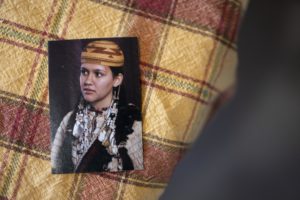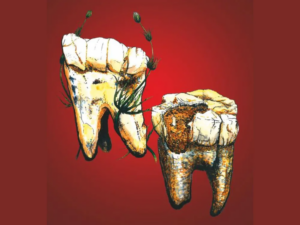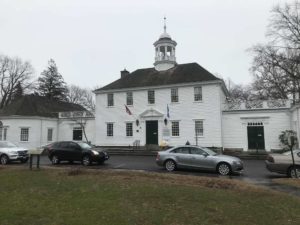College students find themselves navigating a pandemic that has made traveling taboo, with some deciding on a Thanksgiving away from family.
Samantha Moore, a student at Missouri Western State University, is doing Thanksgiving a little differently this year.
After having tested positive for Covid-19 this month, Moore, 21, has decided to skip the usual family-filled festivities she’d grown up enjoying this time of year.
“We normally spend Thanksgiving with my mom’s side of the family,” Moore said of her Thanksgivings at home in Bellevue, Nebraska. “Then the Saturday after, we go to my dad’s parents and we spend time with my dad’s side of the family and we have, like, a Thanksgiving lunch.”
This year, she’ll spend the holiday at her off-campus apartment in St. Joseph, Missouri, with her roommates.
“There’s five of us, including me, that live here. So I think that we’re going to do a little Thanksgiving dinner just with the people that live with me,” Moore said. Her semester is ending before Thanksgiving in her school’s attempt to minimize potential spread of Covid-19 from traveling students, she said.
But even before her diagnosis, Moore hadn’t been sure she’d return home for Thanksgiving.
“I told my family before I got sick: ‘I’m not sure if I’m going to come home because cases are rising,'” she said. “And then I got sick.”
That sealed the deal. Moore, whose father is battling cancer, didn’t want to take any chances.
“We found out probably the beginning of summer that he has bladder cancer,” Moore said. “So it’s kind of a scary thing to go home, especially after having Covid.”
Moore said she believes she contracted the coronavirus around Halloween. She got tested after one of her roommates began displaying symptoms, such as loss of taste and smell. After the roommate tested positive for Covid-19, Moore took a test herself and found out that she was also positive.
Moore said that her parents are upset that they won’t be seeing her but that they understand that she wants to protect them, especially her father.
“He’s been going through chemo, so we’ve been, actually, like, protective of him and making sure that we’re, like, keeping distance,” she said of her father, who’s due for surgery in a few weeks.
Moore said that although she won’t physically be with her family for Thanksgiving, she’ll FaceTime them, and she said she’s hoping she’ll be able to join them in person come Christmastime.
As coronavirus case numbers around the country continue to rise, some colleges and universities are urging students to remain on campus instead of visiting family for Thanksgiving, while others are asking that those who do travel home consider finishing the semester remotely.
As a result, many students have found themselves in the precarious position of deciding among family, safety and school protocols during a pandemic that worsens by the day.
Brielle Gibbs, 20, said all of her classes at the University of Arkansas are online. She’s been living in her off-campus apartment since March, her days mostly consisting of sitting in front of a computer, a routine she said is difficult for a biology major used to in-person labs and large lectures.
But Sunday, she’ll be breaking that routine to return home to Houston to be with her family for Thanksgiving.
“I will be driving on the Sunday before Thanksgiving and spending the week with my family, which is a long drive. It’s nine hours, but I mean, I want to be home with them,” Gibbs said.
As it did with Moore, the coronavirus found its way into her off-campus living arrangement.
“I live in a townhouse. So it’s two stories, and two of my roommates on the bottom floor actually got Covid,” Gibbs said. Her roommates isolated on their floor of the shared townhouse, and she began getting regular tests.
“I got tested three times during that period, and it came back negative every single time,” she said.
Gibbs said she isn’t concerned about returning home now. She misses her family, she said, and as an extra precaution, she will drive home, not fly.
“I’m just happy to go home. See my mom, spend time with my family, my little sisters,” she said. “I don’t get to go home very often, so it’ll be nice to just spend some quality family time in Houston.”
Gibbs said her classes will resume after the weeklong Thanksgiving break her school decided to give students. After Thanksgiving, she plans to return to her townhouse in Arkansas to finish the semester there.
“It’ll be nice to just not have to worry about online school for a week, just to be able to focus on spending time with my family,” she said.
Paul Niekamp, an assistant professor of economics at Ball State University in Indiana who has researched how spring break travel contributed to community spread of the virus, said students should try to wear masks at home and continue to socially distance.
“Student travel around Thanksgiving is especially concerning because there will be a systematic movement of students from dormitories and off-campus housing, where roommates are commonly young, to homes where household members like parents and grandparents may be more vulnerable,” he said by email Thursday.
“Our results imply that increased student travel and gatherings contribute to Covid-19 spread,” Niekamp said. “Finishing the semester remotely prevents millions of students from traveling home, partaking in Thanksgiving gatherings, and then traveling back to campus.”
Pilar Grover said that once she goes home to Chicago to be with her family for Thanksgiving, she won’t return until the spring semester to the University of Virginia, where she has both online and in-person classes as a second-year student.
Normally, students return to campus after Thanksgiving break for finals, but this year, finals will be online, she said.
“I’m going to go home for Thanksgiving, but once I go home, I’m staying home,” said Grover, 20.
She said that her spring semester doesn’t start until Feb. 1 and that she can’t imagine being away from home all that time. “That’s kind of a long time to stay here when I would normally be seeing my family, and all my friends are going to be gone. So I am going home to Chicago,” she said.
Grover wasn’t sure whether she’d fly or drive, but she’s now planning to drive for safety. “At first, I was like I’m definitely going to fly, but now I’m thinking that driving might make more sense and just be a better choice for my own health and my family’s health.”
And because she has a small family — she’s an only child, and her divorced parents live separately — she isn’t concerned about the potential to spread the virus to many other people.
“It’s only two people in the house when I’m home,” she said. “I don’t think I’m going to quarantine to the extreme, like lock myself in my room and don’t come out for 14 days, but I’m definitely going to stay around my house and not really go out.”
Heylee Warren, 19, said Avila University in Kansas City, Missouri, has allowed students to stay in on-campus housing over Thanksgiving break free of charge, one of the changes her school has made during the pandemic.
Warren, however, will be going home to Independence, Missouri, about a 40-minute drive, to be with her family.
At first, she was torn.
“I live with my grandparents when I go home,” she said. “I’ve been scared, because I don’t want to give them Covid if I’m personally exposed to it.”
But Warren said it came down to personal accountability.
“I know people that have gone to parties around Halloween and even at other colleges around in the area, going to parties, like there’s not a pandemic around. And that concerns me, just because it’s never going to go away,” said Warren, who recently tested negative for Covid-19 and is quarantining as a precaution before returning home.
In the second week of December, Warren will have to return to campus for finals.
She said that overall, her school has handled the pandemic well, even as Missouri has recorded over 24,000 new coronavirus cases in the past week.
The University of Missouri, which is two hours east of Avila University, announced Thursday that because of a rise in Covid-19 case numbers in the region, a majority of its in-person courses will temporarily move online. Students who can’t go home for the break can pick up a Thanksgiving meal and participate in safe social events.
Warren so far has had the choice to attend classes in person or online, but as case numbers rise in the state, many classes at Avila University are becoming online only.
“So that’s why a lot of our classes are being put online. They recommended faculty to switch it if they could, and then there’s a select few classes that can meet in person, but with permission,” Warren said, adding that her school has been “really good about communicating those sort of things and making sure that we’re aware of the cases and the quarantines going around.”
Warren said her family is really excited, and relieved, that she’s able to come home for Thanksgiving. For now, she quarantines, counting down the hours until she can be with them.




